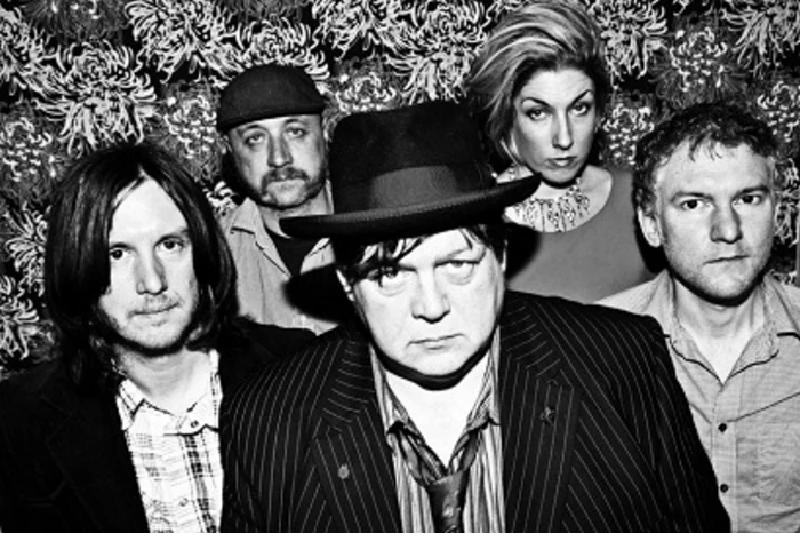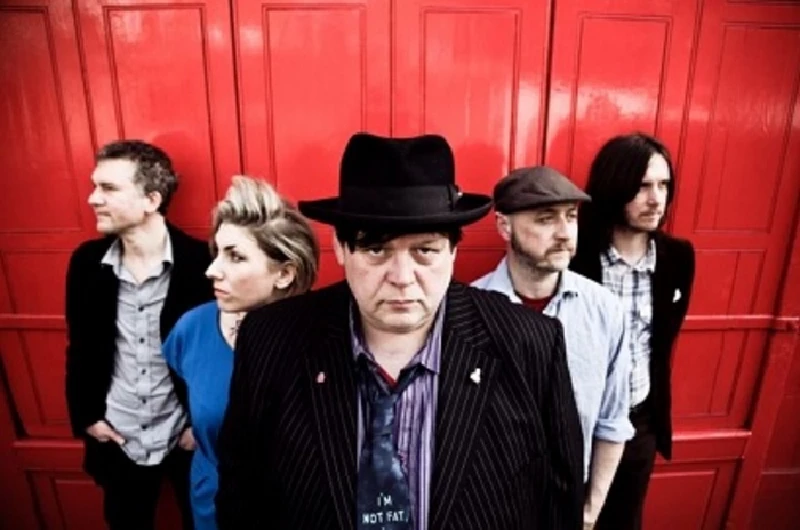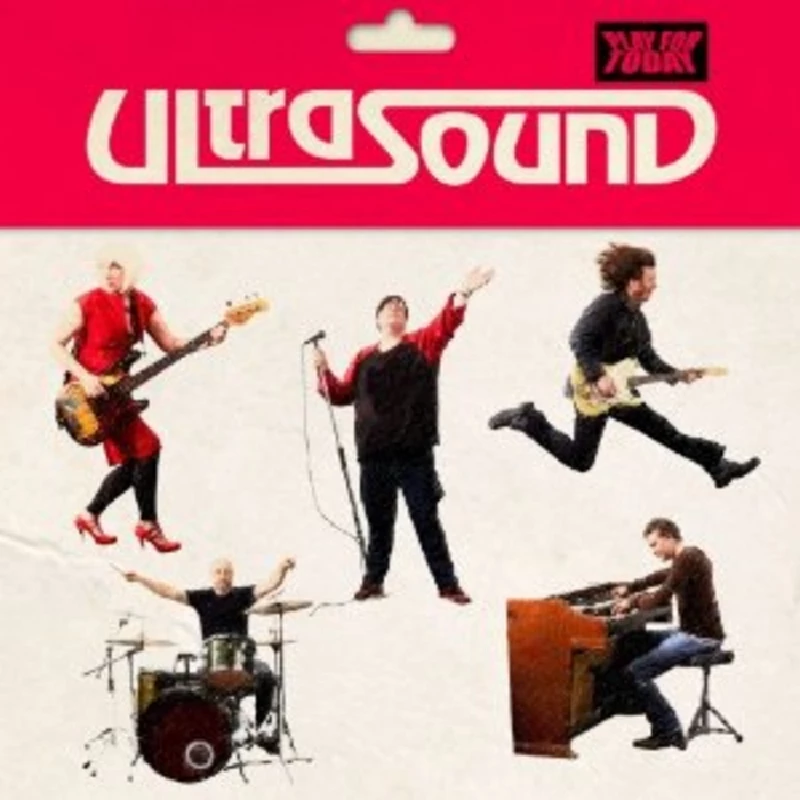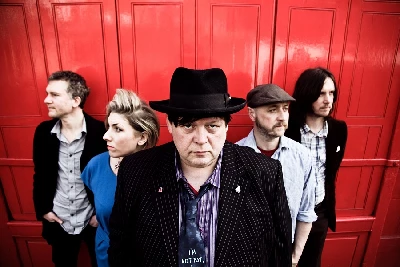Ultrasound - Interview
by John Clarkson
published: 27 / 8 / 2012

intro
John Clarkson speaks to Tiny Wood, the front man with indie guitar outfit Ultrasound about their recent reformation after they acrimonously broke up in the late 1990s, and their second album, 'Play for Today', which follows on fourteen years after their debut
When Ultrasound emerged in 1997 at the tail end of the Britpop era, they stood out from other acts of the time. They took with their music a traditional indie guitar sound, and then extended it to new heights by merging it with elements of epic and prog rock. Their gargantuan, heavily overweight front man Andrew “Tiny” Wood, who was already in his mid-30s and a decade older than most of his band mates, was also far removed from any conventionalities of what a rock star should be. Ultrasound’s first single, ‘Same Band’, which came out as one-off single on Fierce Panda records, sparked a bidding wall, and the group signed to the Nude Records (Suede, Astrid Williamson, Billy Mackenzie). Another four singles, ‘Best Wishes’(1998), ‘Stay Young’ (1998), ‘I’ll Show You Mine if You Show Me Yours’(1998) and ‘Floodlit World’ (1999), followed. Like ‘Same Band’, they won Ultrasound critical and fan acclaim, while a fervent appearance at the 1998 Glastonbury Festival in the pouring rain also drew them further admirers. When their debut album, ‘Everything Picture’, a double CD lasting 112 minutes, and for which the final title track ran alone to 39 minutes, came out in April 1999, it was seen by many to be too much of a good thing and lacking in focus. The band, which also consisted of guitarist Richard Green, drummer Andy Peace, bassist/second singer Vanessa Best and keyboardist Matt Jones, had always suffered from internal friction. After a final single, ‘Aire and Calder’, over which they clashed with Nude over the editing of the track for airplay, Ultrasound broke up acrimoniously in October 1999 shortly after Green, who along with Wood was the main songwriter in the band, walked out on the rest of the group. Ultrasound reformed in 2010, reuniting for a benefit gig for Tim Smith, the front man with Cardiacs, who had suffered a heart attack and a major stroke, and whose band Ultrasound had supported in their early days. While that gig was cancelled at the eleventh hour, Ultrasound have gone on to play further shows in London and Leeds. They have now recorded a belated second album, ‘Play for Today’, for which they have returned to Fierce Panda and will follow at the end of September. Pennyblackmusic spoke to “Tiny” Wood about Ultrasound, and ‘Play for Today’. PB: You sing on ‘Welfare State', which is the opening track on the album amd was the first single, that “we have been away for a while, but were never in style.” When you were around first time around, you received very good write-ups from the press at first, particularly for your first singles, but by the time ‘Everything Picture’ came out in 1999 there was a something of a backlash against you. How much if at all was Ultrasound’s original demise down to being misunderstood by the press and the music buying public? T: A lot of bands become known after they have signed a deal and they have recorded an album, but we didn’t have that luxury really because we became famous before we signed a deal. I wasn’t really concerned about any backlash though. In fact I wasn’t even aware of it at the time. It wasn’t for me a factor. PB: Pennyblackmusic interviewed Vanessa Best in 2003 about her next group the Sunshine Valley Dance Band . She described Ultrasound then as “a beautiful and terrifying force that none of us could control,” and said about it that “it was and is every emotion that you have ever felt, magnified so big that you can no longer see.” Would you agree with her about that? T: Yes, I would agree with her about that. The idea was to include every kind of emotion, no matter how negative that emotion. Whether that had anything to do with our demise I have no idea, but, yes, we always intended to be more intense than the average pop band. You short change people otherwise if you don’t do that really. PB: ‘Everything Picture’ was an uncompromising length for a band with a first album. Given the tensions in the band, did you decide to make something that length because you thought you might not get the chance again and so you decided to put everything into it? T: Yeah, that was the original idea. We thought, “We have got a chance to put an album our here, and we have been trying for years to do that and never got there. This is our chance to get everything we have got on there.” It didn’t actually work out that way because there was more stuff that we could have put on there (Laughs). We just didn’t have the time though to put any more on it really. PB: How much did you and the other members of Ultrasound see of each other before you got back together in 2010? You and Richard Green were involved with Blue Apple Boy and appeared on their 2002 album, ‘Salient’. T: We were, but we didn’t meet. Richard had done his guitar parts already by the time I got involved with Blue Apple Boy. I didn’t see Richard at all then. I think that the last time I saw him was September 1999, and then I didn’t him again until when we met up again in 2010. PB: What about the other three members of the band? T: I didn’t see Vanessa either. I saw Matt occasionally. He played with a lot of different bands after Ultrasound broke up, and, if he was playing Newcastle, he would always give us a bell, and we would meet up every now and again. I also saw Andy quite regularly. PB: As well as being in Blue Apple Boy, what else did you do musically in the years that Ultrasound was apart? T: I formed a band called Siren quite quickly after Ultrasound, and we got offered a deal by Nude Records, but we turned it down because we were advised to turn it down. Nothing really happened after that. I don’t really ring industry people up. I expect them to come for me. If they want me, they know where I am, so I formed this band. We did a lot of gigs, wrote some material, recorded it and that was it really with Siren. PB: When you reformed you got back together originally for a benefit concert for Tim Smith from the Cardiacs, which was cancelled at the last minute. How quickly after you met up again did you start working on your second album? T: It was then and there really. We set all our gear up, and we played ‘Same Band’, and I think that it was within the first minute of ‘Same Band’ that we realised that we should be doing more of this (Laughs). PB: You are not a band who do things by halves, are you? It seems to be all or nothing. T: Yeah (Laughs). PB: After you did the original reformation shows, Matt Jones decided to leave the band again. He plays keyboards for Beady Eye. Why did he decide to do that? Was it because of his commitments to Beady Eye? T: It wasn’t just Beady Eye. He is in a band with his wife, and that was more current to him. He just felt that he couldn’t spread himself any thinner, and that artistically where he was at was with both Beady Eye and this other group, which was fair enough really. PB: Who is Bob Birch who replaced him? T: Bob is a friend of Richard’s from Leeds. Richard spent some time living there in the 2000s. Richard has always wanted to work with Bob, but had never had the opportunity, so when we were looking for someone to replace Matt he put his name forward. Bob is quite a technical guy. He thinks very deeply about stuff. When he is given a project, he really runs with it technically as well as artistically which is odd because you don’t really get that combination. It is either one or the other. PB: How does the songwriting in the band work these days? T: It is certainly more collaborative than it was. It used to be either one of my songs or one of Richard’s songs or occasionally a bit of both. Now we collaborate together a lot more. Richard still brings some songs in, which don’t get changed because they are good enough as they are. It is a question of making a song as good as you can do it, and if you don’t think that you can contribute to that because it is fine as it is then it is best leaving it alone. PB: Is it easy writing songs for the two of you because you live in Newcastle and he is in London now? T: It is never easy writing songs, but as far as getting together is concerned it is not too bad. We work on a lot of the ideas that we have generated during our time away from each other. When we get together, I have this little Walkman Mini thing which I record all of our ideas on and then I take it home and bring it back to rehearsal and add to it. It is actually quite good to have some time away as it gives us time to really think though ideas. PB: How often do you rehearse these days given the locations of the members? T: Unless we have got something on we tend to get together about once a month. Of course if we have got a gig or something like that on, we tend to rehearse more often. PB: Was it an album that took a long time to write? T: t didn’t feel that it did, but it was over the course of a year. Like I said, we only get together once every month, so ideas were worked on and brought back in. If we had got together every day, it would have taken us two weeks. Actually I don’t think that is the case because you have to let your ideas formulate a little bit (Laughs). PB: Just before you split you cancelled various gigs including a T in the Park appearance. You claimed that you were working on a second album then. Was there any truth in that and are any of the songs on this album from those sessions? T: There was some truth in that. We were talking about a second album at that point. We had ideas, but it was really just at the idea stage. There were three or four songs that we had kicking around, a couple of which I noticed appeared on Richard’s next band’s album (Richard Green’s next band was the Somatics. Their album was ‘Did You Ever love me?’ and came out in 2004-Ed). They are all new songs on ‘Play for Today.’ PB: ‘Welfare State’ seems to be at one level about life on the dole, but at another it seems to be a rallying or a clarion call for your group. Do you see it that way? T: Yes, Richard came up with the riff for the song, and he said. “It is kind of like a rallying call.” And so I went away to write a rallying call and it ended up being something else. It just seemed to me that the underclass of society didn’t have a voice and were getting accused of being something-lazy, good for nothing, work shy and all of that-which wasn’t necessarily the case. That is what that song is about. PB: Did you see that song about being about yourself as well because you have spent time on the dole too? T: Yeah, I have spent many years on the dole and I am not ashamed of it. PB: What was ‘Deus Ex Natura’ about? T: (Laughs) Richard had written a few words for that that, but he couldn’t get anywhere with them so he passed the over to me to see what I could do with them. It seemed to me to be the words he had were talking about nature, and so I wrote about how nature keeps getting pushed back by man but eventually always usually crawls back PB: Vanessa takes lead vocals on ‘Glitter Box’. What is that song about? T: ‘Glitter Box’ was just my attempt to point the finger at the people that I believe to be rotten to the core, who are councillors or the council itself. They can make your life a misery and they usually do. I was just trying to write something for Vanessa with that one. It is difficult to write for another voice than your own, but we have always attempted that. She sung on a couple of our earlier songs as well. PB: Now that you are back together do you plan to record more material? T: We have already got ideas for the third album and also the fourth. We will carry on regardless now I think (Laughs). PB: Your gigs, other than one in Leeds, have been so far largely confined to London. Do you hope to tour this album or will you just be continuing to play sporadic dates here and there? T: No, touring would be great. If we can manage it financially, I would love it. It is just a case of logistics, details. If we can do it then we will. PB: Finally it really seems to be an album that seems to be finally made on your own terms, doesn’t it? T: Yes, well, we have no one else to please, have we? PB: Thank you.
Band Links:-
https://www.ultrasoundband.com/https://www.facebook.com/UltrasoundTheBand
https://twitter.com/ultrasoundband
Picture Gallery:-


interviews |
|
Interview (2021) |

|
| Ultrasound vocalist Andrew 'Tiny' Wood speaks to John Clarkson about the reissue in an expanded vinyl edition of their epic 1999 double album, 'Everything Picture'. |
most viewed articles
current edition
Carl Ewens - David Bowie 1964 to 1982 On Track: Every Album, Every SongArmory Show - Interview with Richard Jobson
John McKay - Interview
Colin Blunstone - Thalia Hall, Chicago, 16/7/2025
Billie Eilish - O2 Arena, London, 10/7/2025
Bathers - Photoscapes 1
Visor Fest - Valencia, Spain, 26/9/2025...27/9/2025
Loft - Interview
Sir Tim Rice - Interview
Robert Forster - Interview
previous editions
Manic Street Preachers - (Gig of a Lifetime) Millennium Stadium, Cardiff, December 1999Heavenly - P.U.N.K. Girl EP
Beautiful South - Ten Songs That Made Me Love...
Oasis - Oasis, Earl's Court, London, 1995
Peter Perrett - In Dreams Begin Responsibilities Interview Part One
Boomtown Rats - Ten Songs That Made Me Love....
Coldplay - Wembley Arena. London, 16/8/2022
Prolapse - Interview
Pixies - Ten Songs That Made Me Love...
Trudie Myerscough-Harris - Interview
most viewed reviews
current edition
Davey Woodward - Mumbo in the JumboSick Man of Europe - The Sick Man of Europe
Lucy Spraggan - Other Sides of the Moon
Amy Macdonald - Is This What You've Been Waiting For?
Phew, Erika Kobayashi,, Dieter Moebius - Radium Girls
Bush - I Beat Loneliness
Suzanne Vega - Flying With Angels
Alice Cooper - The Revenge of Alice Cooper
Blueboy - 2
Cynthia Erivo - I Forgive You
Pennyblackmusic Regular Contributors
Adrian Janes
Amanda J. Window
Andrew Twambley
Anthony Dhanendran
Benjamin Howarth
Cila Warncke
Daniel Cressey
Darren Aston
Dastardly
Dave Goodwin
Denzil Watson
Dominic B. Simpson
Eoghan Lyng
Fiona Hutchings
Harry Sherriff
Helen Tipping
Jamie Rowland
John Clarkson
Julie Cruickshank
Kimberly Bright
Lisa Torem
Maarten Schiethart